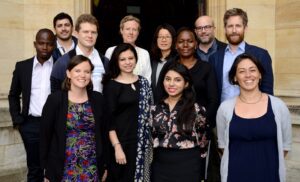
Some of the 2017 Bursary recipients
In 2017, we have been able to offer assistance to 23 individuals enabling them to attend and present at the Conference as follows:
Alison Bukhari, Educate Girls
Outcomes incentivised funding improves results for both enrolment and learning for girls facing exclusion from school in rural India
Amina Singh, Kathmandu University
What can ‘mainstream’ education gain from a deeper understanding about indigenous knowledges and adult learning?
Burcu Meltem Arik Akyuz, Education Reform Initiative (ERI)
Critical glance on the new Turkish curriculum in building sustainability and co-existence
Cyril Brandt, University of Amsterdam
Including Refugees and IDPs: searching for sustainable education solutions in contexts of protracted displacement
Doris M. Kakuru, Uganda Technology and Management University
Insights into the learning crisis in Ugandas primary education.
Fizza Raza, IDEAS
Towards inclusion in teaching and learning in India and Pakistan’s primary schools
Foster Gondwe, Hiroshima University
Comparative policies on Educating Teachers as Researchers: Cases of Japan, Thailand and Malawi
Gayatri Vaidya, Educational Initiatives
Future skills – and inequalities? 21st Century Skills in low and middle-income countries
Goretti Nakabugo, Twaweza East Africa
The role of citizen-led assessments in promoting learning for all
Hiba Salem, University of Cambridge
My Life in Jordan: An exploration of Syrian refugee students’ perceptions of wellbeing
Maithreyi R, Centre for Budget and Policy Studies
Rethinking Learning Assessments: Insights from a Study on the Status of Education in Tribal Districts in Maharashtra (India)
Mansi Nanda, ASER Centre
Early-years education in rural India: how do parents assess teaching and learning?
Marcos Delprato, University of Cambridge
On the impact of aspirations on learning levels of indigenous students in Latin America
Matt Somerville, University of Cambridge
Towards inclusion in teaching and learning in India and Pakistan’s primary schools
Peter Sutoris, University of Cambridge
(De)Politicising Education for Sustainable Development: An Ethnography on the ‘Margins’
Rui da Silva, Center of African Studies of the University of Porto
Teachers´ support in challenging situations: reflections from a teacher professional development programme sustainability in Guinea-Bissau
Sabina Morley, University of Oxford
How do school users assess teaching and learning in secondary schools in Uganda? Can their actions lead to quality improvements?
Shreekanth Mahendiran, Centre for Budget and Policy Studies
Can Open Schooling enable Inclusion at Secondary level education: Evidence from India
Sugata Sumida, Hiroshima University
What are the learning needs in developing countries: A case study of Mozambique
Sushan Acharya, Tribhuvan University
Women, literacy and health in Nepal: an alternative approach for sustainable livelihoods
Tassew Woldehanna, Addis Ababa University
A Rising Tide of Access: What Consequences for Inclusive Learning and Sustainable Development in Ethiopia?
Timothy Reedy, University of Maryland-College Park
Eco-Socialism Education in Cuba: Some Reflections on Global Alternatives
